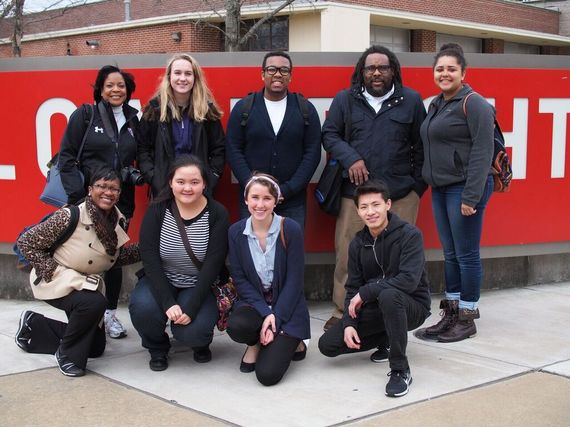During a recent spring break visit to Tennessee and the Mississippi Delta, University of St. Thomas undergraduate students explored the history of the Civil Rights Movement and heard the clarion call to become drum majors for justice. The inaugural spring break trip was created and led by Cynthia Fraction, Excel! Director, who envisioned challenging students to explore the question: How important is it to study the Civil Rights Movement in 2016?
Ms. Fraction embarked on this learning journey with six students and three faculty members (Drs. David Willard, Todd Lawrence, Artika Tyner- myself) to explore this timely question as the issues of civil rights are relived today in many ways from the lack of livable wage jobs and widening wealth gap (March on Washington) to the myriad of impediments to the ballot box due to voter discrimination and felon disenfranchisement (Voting Rights Act 1965).
Our group began the journey by visiting the National Civil Rights Museum where we learned about the transformative power of students who were determined- not to let segregation turn them around. Young people were committed to continue marching for justice and freedom through sit-ins, Freedom Rides and activism. They marched for fair employment, meaningful civil rights laws, quality education, end of Jim Crow and decent housing, to name a few.
Our group also traveled the trail of terror which chronicled Emmett Till's final hours. The trail began in Glendora, Mississippi at the Emmett Till Intrepid Center. The City Mayor Johnny B. Thomas served as our tour guide. The visit explored the blood stained chapter of American history when a 14 year old Black boy, Emmett Till's life was cut short for allegedly whistling at a White woman at the Bryant's Grocery Store in Money, Mississippi. An all-white jury acquitted Roy Bryant and J.W. Millam for the murder of Till however they later admitted their guilt in Look magazine. The death of Till catapulted the civil rights movement. One hundred days later, Rosa Parks took the courageous action to challenge segregation in public transportation.
We also had the honor and privilege of meeting three foot soldiers who actively participated in the 1968 Memphis Sanitation Workers Strike. This strike compelled Rev. Dr. Martin Luther King, Jr. to join in the struggle for economic and racial justice in Memphis. Dr. King brought National attention to labor rights as fundamental civil rights.
"But let me say to you tonight, that whenever you are engaged in work that serves humanity, and is for the building of humanity, it has dignity, and it has worth. One day our society must come to see this," stated Dr. King.
One foot soldier, Mr. Elmore Nickleberry encouraged the students to take action and follow the legacy of Dr. King. "If everyone stood up like Dr. King, this country would be better." Mr. Baxter Leach encouraged future generations to: "get an education, we didn't have a chance. [you] don't have to go to the cotton fields. Go to school to learn."
The trip concluded with a lecture on Rev. Dr. Martin Luther King, Jr.'s final 48 hours. My lecture focused on Dr. King's soul-stirring sermon which was delivered on February 4, 1968 exactly two months before his assassination. In this sermon, "The Drum Major Instinct," Dr. King delivered his own eulogy and left a lasting admonishment for generations to come by challenging each of us to leave the world a better place than how we found it. He compelled everyday people to pick up the mantle of leadership through collective engagement, strategic action, and service.
"If you want to be important--wonderful. If you want to be recognized--wonderful. If you want to be great--wonderful. But recognize that he who is greatest among you shall be your servant. That's a new definition of greatness."
These words are a reminder of our mission at the University of St. Thomas to train students to become morally responsible leaders who think critically, act wisely, and work skillfully to advance the common good.
"Today we stand on the shoulders of a mighty group of people from the south and the north who are expecting us to continue the work needed for the equal rights of all people." Cynthia Fraction
The student participants have committed their work and future vocation to making an impact by becoming drum majors for justice.
For more information about the civil rights research program, visit http://www.stthomas.edu/gro/students/excelresearch/

